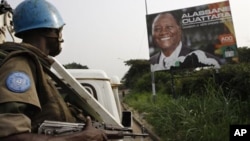Ivory Coast's ambassador to the United Nations says presidential claimant Alassane Ouattara would form a unity government with members of incumbent President Laurent Gbagbo's party, if Gbagbo steps down first.
Youssoufou Bamba told British radio Monday that Mr. Gbagbo should recognize Mr. Ouattara as the country's legitimate president. Bamba said Mr. Gbagbo has "competent people in his party" and that Mr. Ouattara is prepared to work with them "in the framework of a wide, composite cabinet."
The Reuters news agency reports that Mr. Ouattara's team on Monday listed 16 Ivorian treasury, banking and cocoa officials it wants sanctioned for backing Mr. Gbagbo. The incumbent president's access to state accounts at West Africa's central bank already has been frozen, but he still controls taxes, customs and the lucrative oil and cocoa industries.
Mr. Ouattara's proposal for a unity government comes amid mounting pressure on Mr. Gbagbo to cede power and end a standoff that has resulted in violence that killed more than 200 people and threatens to rekindle a civil war.
The U.N. Security Council issued a statement Monday expressing deep concern at continued violence and human rights violations in Ivory Coast - including against peacekeepers. It condemned attempts to prevent the U.N. force from protecting civilians and investigating atrocities.
The U.S. Embassy in Abidjan held a meeting with American citizens Monday and urged them to leave the country while commercial flights are still available.
Foreign embassies already have ordered a majority of their staff to leave as anti-Western sentiment simmers. Mr. Gbagbo's government continues to use the state broadcasting arm to denounce what it calls the "Franco-American plot" behind calls for his ouster.
In its statement Monday, the security council demanded an immediate halt to the use of Ivorian media to propagate "false information" that incites "hatred and violence, including against the United Nations."
There has been no visible progress toward resolving Ivory Coast's political crisis, despite new mediation efforts by Nigeria's former president, Olusegun Obasanjo. Mr. Obasanjo left the West African nation late Sunday, after holding separate talks in Abidjan with Mr. Gbagbo and Mr. Ouattara.
The former Nigerian leader said he is optimistic the standoff can be resolved, but he did not rule out military intervention to oust Mr. Gbagbo. The West African bloc ECOWAS has threatened to remove Mr. Gbagbo by force unless he relinquishes power to Mr. Ouattara.
The international community recognizes Mr. Ouattara as the winner of November's presidential election. Mr. Gbagbo insists that he won the vote and has defied intense international pressure to relinquish power.
Pro-Gbagbo forces continue to keep Mr. Ouattara confined to the Abidjan hotel where he has been for about a month.
Ouattara Offers Ivory Coast Unity Government If Gbagbo Steps Down




